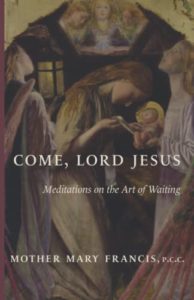Podcast: Play in new window | Download (Duration: 9:08 — 6.4MB) | Embed
Subscribe: Apple Podcasts | Spotify | Amazon Music | Android | Pandora | iHeartRadio | JioSaavn | Podchaser | Gaana | Podcast Index | Email | TuneIn | Deezer | Anghami | RSS | More

CLJ6 – Joyful Penitence – ‘Come, Lord Jesus’ by Mother Mary Francis, P.C.C.
An excerpt from Come, Lord Jesus: Meditations on the Art of Waiting:
 Joyful Penitence
Joyful Penitence
My dear Sisters, in this third week of Advent following upon Gaudete Sunday, we find a deep call, a profound call, to the understanding of penance. I think the Church is trying to teach us that real penance is always characterized by joy, that joy is a property of penance. When we look at penitence, we could perhaps list many properties, many characteristics and effects of penance; and we can all develop this in prayer. For today, I would like to linger a bit on three outstanding characteristics and effects of penance, three which I would venture to say are the most prominent. They are both property and effect; they are both descriptive of what is there and are a function of what is there. These three are: purpose, alertness, and joy.
Now, when we really become aware of how much we need to do penance, of how much we have sinned and are at fault, we could question (if we look at it in a superficial way) how we could be joyful. Would we not grow sadder and sadder? But, no, this is not true. And so let us look at that first property and effect: purpose. Real penance is always purposeful. And this characteristic is also an effect; that is, the more we truly realize our state as penitents, the more purpose we have to amend. We know that, in the Sacrament of Penance, we cannot be absolved from our sins if we do not have a firm purpose of amendment. Contrition is not real—it is not only incomplete, but it is not real—if there is no true purpose of amendment. This does not mean that we may not fall again, but it does mean that I am full of purpose, that I am not going to go on like this, that I am not going to keep doing this. That is what characterizes real penance. A weak wailing about my faults, with no evident purpose to do anything about them, has nothing to do with penance. It has a lot to do with cowardice, it has a lot to do with pride, and it is an expression of lack of purposefulness.
But real penance is a driving force. We see this dramatically in our Father Saint Francis. He wept because “Love is not loved.” He just could not get over this, and he was so driven by this, that Love was not loved enough by him. He went on with such purpose that in the sacred stigmata, love finally broke out all over him.
Francis P.C.C., Mother Mary. Come, Lord Jesus (pp. 135-136). Ignatius Press. Kindle Edition.
Mother Mary Francis, P.C.C., (1921-2006) was for more than forty years the abbess of the Poor Clare Monastery of Our Lady of Guadalupe in Roswell, New Mexico. She became recognized as an authoritative voice for the renewal of religious life through her many books, including A Right to Be Merry, But I Have Called You Friends, and Anima Christi. To learn more about Mother Mary Francis and the Poor Clare Nuns of Roswell, NM visit their website at https://poorclares-roswell.org

Discerning Hearts is grateful to Cluny Media whose permission was obtained to record these audio selections from this published work.

